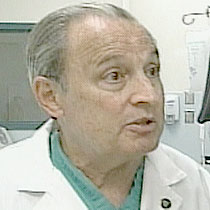-
(单词翻译:双击或拖选)
By Carol Pearson
Washington
13 September 2007
American professional football player Kevin Everett fractured his neck during a game, 9 September 2007. He remains1 sedated2 and in intensive care. It is too early to tell if Everett will recover fully3. The doctors who rushed to his aid tried an experimental technique that may save his life and even allow him to walk again. VOA's Carol Pearson has more.
It seemed like just another football play, a charge by the Buffalo4 Bill's Kevin Everett, except for an accident.
In a collision with another player, Kevin Everett, falls to the ground. His fellow players knelt down to pray as Everett was carried off the field on a stretcher. After surgery, a team doctor offered somber5 words.
Dr. Andrew Cappuccino, team doctor says, "I told Kevin that the chances of a full neurologic recovery were bleak6."
 |
| Dr. Barth Green |
Doctors lowered Everett's body temperature within minutes of his injury, preventing the injury from getting worse.
"What they did is they took an athlete that was injured 15 minutes earlier, and they lowered his body temperature within minutes of his injury, and they were able to protect his spinal cord from permanent damage. That was never done before," Dr. Green said.
This technology did not exist 12 years ago, when actor Christopher Reeve was injured. Reeve was paralyzed after falling off a horse. Afterward10, he raised money -- and awareness11 - for research on spinal cord injuries.
"Scientists are already talking about the day when having a spinal cord injury will not result in paralysis," Reeve once said, though he did not live to see that day.
But the foundation he created provides funding for the University of Miami's Project to Cure Paralysis. "Christopher Reeve used to say it's what you do after the accident that matters. That early intervention12, to know exactly how to treat the patient is critically important," said Peter Wilderotter, the foundation's president.
As of Wednesday (12 September), the Buffalo Bills' web site said Kevin Everett's injury is still potentially lethal13, and it is too early to predict the outcome.
But if Everett does walk again, it will be the result of dedicated14 medical research.
 收听单词发音
收听单词发音
1
remains

|
|
| n.剩余物,残留物;遗体,遗迹 | |
参考例句: |
|
|
|
2
sedated

|
|
| v.使昏昏入睡,使镇静( sedate的过去式和过去分词 ) | |
参考例句: |
|
|
|
3
fully

|
|
| adv.完全地,全部地,彻底地;充分地 | |
参考例句: |
|
|
|
4
buffalo

|
|
| n.(北美)野牛;(亚洲)水牛 | |
参考例句: |
|
|
|
5
somber

|
|
| adj.昏暗的,阴天的,阴森的,忧郁的 | |
参考例句: |
|
|
|
6
bleak

|
|
| adj.(天气)阴冷的;凄凉的;暗淡的 | |
参考例句: |
|
|
|
7
severely

|
|
| adv.严格地;严厉地;非常恶劣地 | |
参考例句: |
|
|
|
8
spinal

|
|
| adj.针的,尖刺的,尖刺状突起的;adj.脊骨的,脊髓的 | |
参考例句: |
|
|
|
9
paralysis

|
|
| n.麻痹(症);瘫痪(症) | |
参考例句: |
|
|
|
10
afterward

|
|
| adv.后来;以后 | |
参考例句: |
|
|
|
11
awareness

|
|
| n.意识,觉悟,懂事,明智 | |
参考例句: |
|
|
|
12
intervention

|
|
| n.介入,干涉,干预 | |
参考例句: |
|
|
|
13
lethal

|
|
| adj.致死的;毁灭性的 | |
参考例句: |
|
|
|
14
dedicated

|
|
| adj.一心一意的;献身的;热诚的 | |
参考例句: |
|
|
|















